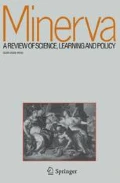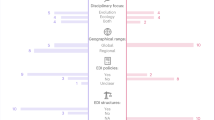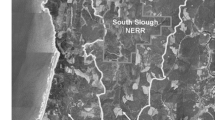Abstract
Studies of how scientists select research problems suggest the process involves weighing a number of factors, including funding availability, likelihood of success versus failure, and perceived publishability of likely results, among others. In some fields, a strong personal interest in conducting science to bring about particular social and environmental outcomes plays an important role. Conservation biologists are frequently motivated by a desire that their research will contribute to improved conservation outcomes, which introduces a pair of challenging questions for managers of science and scholars of policies governing science: 1) How do scientists integrate that goal into their processes of research priority evaluation, and 2) How can managers and funders of science utilize that knowledge in designing and administering funding programs? I use Q method to uncover four distinct schools of thought amongst researchers and knowledge-users about the merits of possible research priorities for coral reefs; one of the axes along which these schools of thought differ is in their interpretation of how science can and should interact with policy. The results reveal that perceived severity of reef stressors plays a role for some participants. Disciplinary training does not appear to be a major influence on research priority evaluation, but individual participants indicated professional expediency does prevent some researchers from pursuing or advocating that others pursue topics outside of that disciplinary specialty. Influences on and processes in research prioritization uncovered in this study have the potential to lead to counter-productive disciplinary path dependencies. From these results and building on outside literature, I conclude that better coordination and communication about research priorities across disciplines and with broader stakeholders – including knowledge users – could improve the research enterprise’s ability to contribute to meaningful societal and conservation goals. These findings are relevant to researchers and research administrators across disciplines that seek to conduct or fund science that is useful in addressing specific goals.
Similar content being viewed by others
Notes
“Path dependence” refers to a phenomenon wherein circumstances and decisions at one point constrain choices available in the future and encourage further decisions in that same direction (North 1990).
Steven Brown describes this analytical approach in an email to the Q method listserv (https://listserv.kent.edu/cgi-bin/wa.exe?A0=Q-METHOD ) on September 9, 2008.
Statements such as these were not common, but are included here to demonstrate the diversity of motivations and justifications behind shared understandings of “important” research.
The severity of stressors in a given region is a question that is plausibly amenable to technical adjudication, but that would also likely benefit from non-technical forms of expertise (cf., Wynne 1989).
References
Addams, Helen, and John Proops. 2000. Social discourse and environmental policy: An application of Q methodology. Northampton, MA: Edward Elgar Publishing.
Aronson, Richard B., et al. 2003. Causes of coral reef degradation. Science 302: 1502–1504.
Australian Institute of Marine Science. 2007. Australian Institute of Marine Science Research Plan 2007–2011. Townsville, Queensland, Australia: AIMS.
Bischof, Bärbel G. 2010. Negotiating uncertainty: Framing attitudes, prioritizing issues, and finding consensus in the coral reef environment management “crisis”. Ocean & Coastal Management 53: 597–614. doi:10.1016/j.ocecoaman.2010.06.020.
Bozeman, Barry, and Daniel Sarewitz. 2011. Public value mapping and science policy evaluation. Minerva 49(1): 1–23. doi:10.1007/s11024-011-9161-7.
Braun, Dietmar. 1993. Who governs intermediary agencies? Principal-agent relations in research policy-making. Journal of Public Policy 13: 135–162.
Braun, Dietmar, and David H. Guston. 2003. Principal-agent theory and research policy: An introduction. Science and Public Policy 30: 302–308.
Brown, Steven R. 1980. Political subjectivity: Applications of Q methodology in political science. New Haven, CT: Yale University Press.
Brown, Steven R. 1989. A feeling for the organism: Understanding and interpreting political subjectivity. Operant Subjectivity 12: 81–97.
Brown, Steven R. 1996. Q methodology and qualitative research. Qualitative Health Research 6: 561–567.
Brown, Steven R. 1998. Autobiography and problem selection. Society for Policy Sciences conference, Yale University School of Law. http://facstaff.uww.edu/cottlec/QArchive/Yale98.html.
Buddemeier, Robert W., Joan A. Kleypas, and Richard B. Aranson. 2004. Coral reefs and climate change: Potential contributions of climate change to stresses on coral reef ecosystems. Washington, DC: Pew Center on Global Climate Change.
Burke, Lauretta, and Jonathan Maidens. 2004. Reefs at risk in the Caribbean. Washington, DC: World Resources Institute.
Busch, Lawrence, William B. Lacy, and Carolyn Sachs. 1983. Perceived criteria for research problem choice in the agricultural sciences—A research note. Social Forces 62: 190–200.
Callon, Michel, John Law, and Arie Rip. 1986. Mapping the dynamics of science and technology: Sociology of science in the real world. London: Macmillan.
Campbell, Andrea Louise. 2003. How policies make citizens: Senior political activism and the American welfare state. Princeton, NJ: Princeton University Press.
Carayol, Nicolas, and Jean-Michel Dalle. 2007. Sequential problem choice and the reward system in open science. Structural Change and Economic Dynamics 18: 167–191.
Cash, David W., Jonathan C. Borck, and Anthony G. Patt. 2006. Countering the loading-dock approach to linking science and decision making. Science, Technology & Human Values 31: 465–494.
Cash, David W., et al. 2003. Knowledge systems for sustainable development. Proceedings of the National Academy of Sciences 100: 8086.
Clark, William C., Laura Holliday, and National Research Council (U.S.). 2006. Linking knowledge with action for sustainable development the role of program management: Summary of a workshop. Washington, DC: National Academies Press.
Davies, B.B., and I.D. Hodge. 2007. Exploring environmental perspectives in lowland agriculture: A Q methodology study in East Anglia, UK. Ecological Economics 61: 323–333.
Debackere, Koenraad, and Michael A. Rappa. 1994. Institutional variations in problem choice and persistence among scientists in an emerging field. Research Policy 23: 425–441.
Giddens, Anthony. 1984. The constitution of society: Outline of the theory of structuration. Berkeley, CA: University of California Press.
Gieryn, Thomas F. 1978. Problem retention and problem change in science. Sociological Inquiry 48: 96.
Glaser, Barney G., and Anselm L. Strauss. 1967. The discovery of grounded theory: Strategies for qualitative research. New York: Aldine de Gruyter.
Guston, David H. 1996. Principal-agent theory and the structure of science policy. Science and Public Policy 23: 229–240.
Guston, David H. 2001. Boundary organizations in environmental policy and science: An introduction. Science, Technology, and Human Values 26: 399–408.
Guston, David H. 2004. Forget politicizing science. Let’s democratize science! Issues in Science and Technology 21: 25–28.
Hacking, Ian. 1999. The social construction of what? Cambridge, MA: Harvard.
Hall, Clare. 2008. Identifying farmer attitudes towards genetically modified (GM) crops in Scotland: Are they pro- or anti-GM? Geoforum 39: 204–212.
Halpern, B.S., et al. 2008. A global map of human impact on marine ecosystems. Science 319: 948–952.
Hughes, T.P., et al. 2003. Climate change, human impacts, and the resilience of coral reefs. Science 301: 929–933.
Kingdon, John W. 1984. Agendas, alternatives, and public policies. New York: Harper Collins.
Kitcher, Philip. 2001. Science, truth, and democracy. New York: Oxford University Press.
Kitcher, Philip. 2003. What kinds of science should be done. In Living with the genie, eds. Alan Lightman, Daniel Sarewitz, and Christina Desser, 201–224. DC: Island Press.
Kleypas, Joan A., and C. Mark Eakin. 2007. Scientists’ perceptions of threats to coral reefs: Results of a survey of coral reef researchers. Bulletin of Marine Science 80: 419–436.
Kuhn, Thomas S. 1996. The structure of scientific revolutions, 3rd ed. Chicago: University of Chicago Press.
Lasswell, Harold D., and Myres S. McDougal. 1992. Jurisprudence for a free society: Studies in law, science, and policy. The New Haven Studies in International Law and World Public Order. Dordrecht, Netherlands; Boston: M. Nijhoff.
Latour, Bruno. 2004. Politics of nature. Cambridge, MA: Harvard University Press.
Matso, Kalle E., et al. 2008. Establishing a minimum standard for collaborative research in federal environmental agencies. Integrated Environmental Assessment and Management 4: 362–368. doi:10.1897/IEAM_2007-070.1.
Mattson, David, Susan G. Clark, Kimberly L. Byrd, Steven R. Brown, and Bart Robinson. 2011. Leaders’ perspectives in the Yellowstone to Yukon Conservation Initiative. Policy Sciences 44: 103–133. doi:10.1007/s11077-011-9127-5.
Mattson, David J., Kimberly L. Byrd, Murray B. Rutherford, Steven R. Brown, and Timothy W. Clark. 2006. Finding common ground in large carnivore conservation: Mapping contending perspectives. Environmental Science & Policy 9: 392–405. doi:10.1016/j.envsci.2006.01.005.
McKeown, Bruce, and Dan Thomas. 2013. Q methodology, 2nd ed. Quantitative Applications in the Social Sciences 66. Thousand Oaks, CA: SAGE.
McNie, Elizabeth C. 2007. Reconciling the supply of scientific information with user demands: An analysis of the problem and review of the literature. Environmental Science & Policy 10: 17–38.
Merton, Robert K. 1938. Science, technology and society in seventeenth century England. Osiris 4: 360–632.
Miller, Clark. 2001. Hybrid management: Boundary organizations, science policy, and environmental governance in the climate regime. Science, Technology & Human Values 26: 478–500.
Miller, Thaddeus R., and Mark W. Neff. 2013. De-facto science policy in the making: How scientists shape science policy and why it matters (or, why STS and STP scholars should socialize). Minerva 51(3): 295–315. doi:10.1007/s11024-013-9234-x.
National Oceanic and Atmospheric Administration. 2007a. Coral reef ecosystem research plan (Part I: National research priorities). Silver Spring, MD, USA: National Oceanic and Atmospheric Administration.
National Oceanic and Atmospheric Administration. 2007b. Coral reef ecosystem research plan (Part II: Regional research priorities-jurisdiction wide). Silver Spring, MD, USA: National Oceanic and Atmospheric Administration.
Neff, Mark W. 2011. What research should be done and why? Four competing visions among ecologists. Frontiers in Ecology and the Environment 9: 462–469. doi:10.1890/100035.
Neff, Mark W., and Elizabeth Corley. 2009. 35 years and 160,000 articles: A bibliometric exploration of the evolution of ecology. Scientometrics 80: 657–682.
Neff, Mark W., and Brendon M. H. Larson. 2014. Scientists, managers, and assisted colonization: Four contrasting perspectives entangle science and policy. Biological Conservation 172: 1–7. doi:10.1016/j.biocon.2014.02.001.
Niemeyer, Simon, Judith Petts, and Kersty Hobson. 2005. Rapid climate change and society: Assessing responses and thresholds. Risk Analysis 25: 1443–1456.
North, Douglass C. 1990. Institutions, institutional change, and economic performance. Cambridge; New York: Cambridge University Press.
Pandolfi, J.M., et al. 2003. Global trajectories of the long-term decline of coral reef ecosystems. Science 301: 955–958.
Robbins, Paul, and Rob Krueger. 2000. Beyond bias? The promise and limits of Q method in human geography. Professional Geographer 52: 636.
Sandbrook, Chris, Ivan R. Scales, Bhaskar Vira, and William M. Adams. 2011. Value plurality among conservation professionals. Conservation Biology 25: 285–294. doi:10.1111/j.1523-1739.2010.01592.x.
Shove, Elizabeth. 2003. Principals, agents and research programmes. Science and Public Policy 30: 371–381. doi:10.3152/147154303781780308.
SPARC. 2010. Usable science: A handbook for science policy decision makers. http://cstpr.colorado.edu/sparc/outreach/sparc_handbook/index.html. Accessed 26 Aug 2011.
Van Kerkhoff, Lorrae, and Louis Lebel. 2006. Linking knowledge and action for sustainable development. Annual Review of Environment and Resources 31: 445–477. doi:10.1146/annurev.energy.31.102405.170850.
Webler, Thomas, S. Danielson, and S. Tuler. 2009. Using Q method to reveal social perspectives in environmental research. Greenfield, MA: Social and Environmental Research Institute.
Wilkinson, Clive. 2004. Status of coral reefs of the world: 2004. Townsville, Queensland, Australia: Global Coral Reef Monitoring Network & Australian Institute of Marine Science.
Woolley, John T., and Michael Vincent McGinnis. 2008. The conflicting discourses of restoration. Society & Natural Resources 13: 339–357.
Wynne, Brian. 1989. Sheep farming after Chernobyl: A case study in communicating scientific information. Environment 31: 10–39.
Ziman, John M. 1981. What are the options? Social determinants of personal research plans. Minerva 19: 1–42.
Ziman, John M. 1987. The problem of “problem choice”. Minerva 25: 92–106.
Zuckerman, Harriet. 1978. Theory choice and problem choice in science. Sociological Inquiry 48: 65.
Zuckerman, Harriet. 1989. The other Merton thesis. Science in Context 3: 239–267.
Acknowledgments
With thanks to D. Sarewitz, D. Guston, E. Corley, C. Miller, A. Smith, and A. Kinzig for critical feedback on this research, and L. Hidinger and K. Darby for assistance with data collection. I am also indebted to Editors Weingart and Taubert, as well as multiple reviewers for their insightful suggestions. This material is based on work supported by the National Science Foundation (NSF) under grants #0345604 and #0504248. Any opinions, findings, conclusions, and/or recommendations expressed in this material are those of the author and do not necessarily reflect the views of the NSF.
Author information
Authors and Affiliations
Corresponding author
Electronic supplementary material
Below is the link to the electronic supplementary material.
Rights and permissions
About this article
Cite this article
Neff, M.W. Research Prioritization and the Potential Pitfall of Path Dependencies in Coral Reef Science. Minerva 52, 213–235 (2014). https://doi.org/10.1007/s11024-014-9250-5
Published:
Issue Date:
DOI: https://doi.org/10.1007/s11024-014-9250-5




